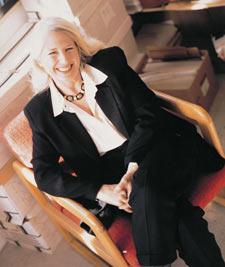
Nancy Wexler's mother died of Huntington's disease in 1978. Wexler had finished her Ph.D. in clinical psychology just four years earlier, but the focus of her degree notwithstanding, Wexler was determined to learn the necessary genetics to determine what steps she could take to eradicate the disease. Huntington's disease was known to be hereditary - a parent with the disease has a 50% chance of passing the disease on to a child - but in the 1970s, the idea of mapping genes was in its infancy. By jumping into the fray, Wexler enabled researchers to find a marker for the Huntington's gene, which led to a test for the disease and ultimately to mapping the gene itself, leading to the hope of one day finding a cure.
Wexler took but one biology course during her undergraduate career at Radcliff, where she graduated with a major in social relations and English in 1967. She went on to the University of Michigan where she earned her clinical psychology Ph.D. in 1974. But ever since 1968, she has become more involved with a non-profit organization that her father had started in honor of her mother, The Hereditary Disease Foundation. She learned of a Venezuelan town near Lake Maracaibo where numerous members of an extended family suffered from Huntington's Disease. In 1981, at a time when she was on staff at the National Institute of Neurological Disorders and Stroke, Wexler made a trip to this community. She earned the community's trust when she explained that she too was at risk for the disease that the locals termed "El Mal." Within months she had some 1,200 DNA samples and had mapped out extensive genealogical charts. She brought the samples to three biologists in the U.S. who found a consistent marker on chromosome 4 of those people with Huntington's disease. Knowing where the gene lay and what a bit of it looked like meant that a test for the disease would soon be developed.
To this day, Wexler regularly visits the community in Venezuela where she has now collected a family tree of over 18,000 people and some 4,000 blood samples. The Venezuelan samples have been used to find the gene for numerous diseases including familial Alzheimer's, kidney cancer, two kinds of neurofibromatosis, Amyotrophic Lateral Sclerosis (ALS), and others.
Since 1985, Wexler has been a professor in the Department of Neurology and Psychology at Columbia University. Among many honors, Wexler has been given the Foster Elting Bennett Award (1993), and the Albert Lasker Public Service Award (1993). She divides her time between teaching and the Hereditary Disease Foundation. She also continues to visit Venezuela and serves as chair of the Ethics Working Group of the Human Genome Project.
Wexler herself has never said whether she's taken the test for Huntington's Disease that she helped create—only saying that the knowledge that one has the disease for certain might be more than some people wish to live with.
Information as of April 2007

